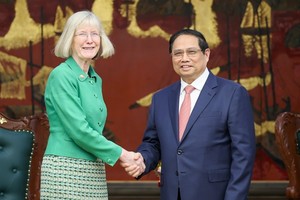Competition is intensifying in South Korea to nurture individual content creators for online video services as their new channels of videos help platform providers increase ad revenue, said Yonhap.

Following in the footsteps of YouTube and Facebook, South Korean telecom firms, such as KT Corp. and LG Uplus Corp., are competing to offer incentives and technical know-how to attract video creators to their platforms.
Still, the Korean market for online video services by individual content creators is in its nascent stage, market watchers say.
KT, the nation's dominant fixed-line Internet service provider and second-largest mobile carrier, launched a new video-service platform called "dovido" on Tuesday.
The video platform allows users to create and edit their channels of videos via their smartphones.
Unlike personal computer-based video platforms, the new platform enables users to sell goods via their channels.
Kang Min-ho, executive vice president of KT's platform service business, told reporters that, "YouTube still shows a lack of capability in mobile commerce."
The new platform is expected to help individual users create their own channels of mobile commerce and increase their subscription bases, Kang said.
In July, LG Uplus, the nation's third-largest mobile carrier, selected 100 creators for virtual reality videos and gave them lessons on how to shoot and edit virtual reality videos. Their videos are being watched on LG Uplus' video platform.
In June, YouTube established the "Creator Hub" that offers tools for individual video creators to bring their ideas to life.
Among the 20 channels of videos in South Korea that saw their subscribers rise in the first-half of this year, 19 channels were being aired by individual creators, according to YouTube's Korean unit.
As of May, about 30 YouTube channels boasted more than 1 million subscribers each.
Kim Beom-hyu, head of content partnership department at YouTube's Korean unit, said, "The role of creators is significant, although there is various content on YouTube."
"We plan to offer steady support for creators," Kim said.
As subscribers for video channels grow, so do advertising sales.
YouTube has shared advertising revenue with content creators.
According to an estimate by market researcher eMarketer, the global market for online video advertising is expected to grow to US$12.8 billion in 2018, from $5.8 billion in 2014.
"Competition is heating up for platform providers to attract star creators," said an official at a platform provider.











)












